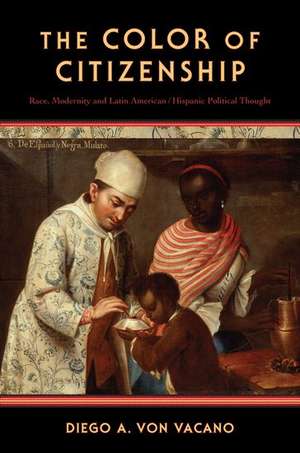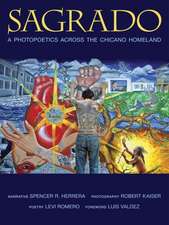The Color of Citizenship: Race, Modernity and Latin American / Hispanic Political Thought
Autor Diego Von Vacanoen Limba Engleză Hardback – 16 feb 2012
Preț: 626.44 lei
Preț vechi: 832.45 lei
-25% Nou
Puncte Express: 940
Preț estimativ în valută:
119.88€ • 130.18$ • 100.70£
119.88€ • 130.18$ • 100.70£
Carte tipărită la comandă
Livrare economică 11-17 aprilie
Preluare comenzi: 021 569.72.76
Specificații
ISBN-13: 9780199746668
ISBN-10: 0199746664
Pagini: 240
Dimensiuni: 239 x 163 x 23 mm
Greutate: 0.45 kg
Editura: Oxford University Press
Colecția OUP USA
Locul publicării:New York, United States
ISBN-10: 0199746664
Pagini: 240
Dimensiuni: 239 x 163 x 23 mm
Greutate: 0.45 kg
Editura: Oxford University Press
Colecția OUP USA
Locul publicării:New York, United States
Recenzii
Diego von Vacano puts Latin American and Hispanic political thought in the forefront as he examines, with originality and precision, the role that race has played and can play in both political thought and theory. As a central factor of the lived experience of individuals in the modern world, race as a synthetic concept illuminates the workings of politics, power, and citizenship and challenges the ways in which race has traditionally been elided in Western political thought.
Diego von Vacano's important new book forces us to rethink central assumptions about modernity and race that have long been part of European and North American intellectual traditions. Through the writings of four major Spanish American intellectuals, spanning fully 400 years, The Color of Citizenship explores the evolution of racial ideas based on mixture and fluidity rather than purity and stability. With The Color of Citizenship, the important contributions of Latin Americans to thinking about race can no longer be ignored.
The Color of Citizenship is an excellent genealogy of racial thinking and post-colonial states in the Americas. Scholars of philosophy, political theory, and race will better understand the complicated and 'synthetic' nature of racial discourse in the Americas from reading this book.
By examining what a selected number of Spanish American thinkers had to say about race, regardless of their politics, Diego von Vacano's book is a most valuable contribution on various fronts. It offers a fruitful and exceptional interdisciplinary engagement between political philosophy and the history of ideas, which is also an invitation to take more seriously Latin American political thinkers. More substantially, it traces a 'particular intellectual tradition' towards a 'modern synthetic conceptualization of race,' one that accepts the values of miscegenation against hierarchical and dualistic paradigms of race. By placing a reconceptualised notion of race at the centre of political philosophy, von Vacano identifies the basis of a universally inclusive notion of citizenship. What is discussed here is undoubtedly relevant to key debates in our contemporary societies.
This stunningly original and thoughtful work demonstrates the tremendous potential of comparative political theory. Highly recommended.
Diego von Vacano's important new book forces us to rethink central assumptions about modernity and race that have long been part of European and North American intellectual traditions. Through the writings of four major Spanish American intellectuals, spanning fully 400 years, The Color of Citizenship explores the evolution of racial ideas based on mixture and fluidity rather than purity and stability. With The Color of Citizenship, the important contributions of Latin Americans to thinking about race can no longer be ignored.
The Color of Citizenship is an excellent genealogy of racial thinking and post-colonial states in the Americas. Scholars of philosophy, political theory, and race will better understand the complicated and 'synthetic' nature of racial discourse in the Americas from reading this book.
By examining what a selected number of Spanish American thinkers had to say about race, regardless of their politics, Diego von Vacano's book is a most valuable contribution on various fronts. It offers a fruitful and exceptional interdisciplinary engagement between political philosophy and the history of ideas, which is also an invitation to take more seriously Latin American political thinkers. More substantially, it traces a 'particular intellectual tradition' towards a 'modern synthetic conceptualization of race,' one that accepts the values of miscegenation against hierarchical and dualistic paradigms of race. By placing a reconceptualised notion of race at the centre of political philosophy, von Vacano identifies the basis of a universally inclusive notion of citizenship. What is discussed here is undoubtedly relevant to key debates in our contemporary societies.
This stunningly original and thoughtful work demonstrates the tremendous potential of comparative political theory. Highly recommended.
Notă biografică
Diego von Vacano is Assistant Professor of Political Science at Texas A&M University and Fellow at the Center for Advanced Study in the Behavioral Sciences at Stanford University. He was previously a Fellow at the Institute for Advanced Study in Princeton, and is the author of The Art of Power.








